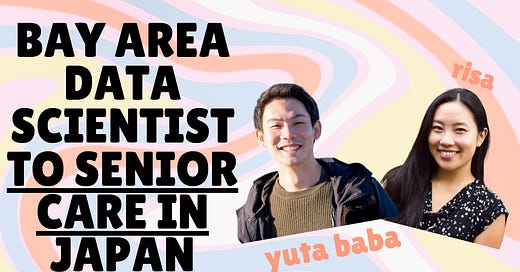I became a caregiver at 25, now I’m redesigning senior care in Japan - Yuta Baba (CareVo)
Senior care, unlike childcare, comes out of the blue. You're never prepared for it.
As children, our parents are as perfect as humans could be.
We learn to talk, walk, eat, and sleep by watching our parents, unknowingly believing that “correct” looks like how mom and dad does it.
As teenagers, you start to realize that mom and dad are also human, with ex-boyfriends and ex-girlfriends, with an entire life before me, with flaws and insecurities like the rest of us do.
As adults, you start to see their hair greying, their movements slowing, and their force fading. And while in our eyes, they will forever be our parents that we learned the basics of life from, they become a softer image of the perfect human that once saved us from the world, and we have no choice but to accept that they’re mortals too.
Taking care of our senior parents is a life stage that most of us will go through in our lifetime, yet we don’t talk about it nearly as much as we do childcare. And it’s because unlike childcare, seniors do not grow up and become incredible humans.
It’s taboo, inelegant, and sad; or that’s how society often perceives it.
But I will repeat myself, it is something that MOST of us will go through at some point in our lifetime.
And while emotionally dealing with your parents’ or partner’s mortality is already painful in itself, to do it completely on your own, with mountains of paperwork, with the physical labor is really unimaginable.
This is exactly what the 7M family caregivers in Japan are wrestling with every day.
On this episode of The Cool People Podcast, I chat with Yuta Baba, founder of CareVo, a startup redesigning senior care in Japan.
After building a successful career at Snowflake developing financial forecasting algorithms, Yuta's life took an unexpected turn when he had to return to Japan to become his mother's primary caregiver. This personal experience revealed the deep challenges within Japan's senior care system and inspired him to create CareVo.
In this raw and honest conversation, Yuta shares his journey from unexpectedly becoming a caregiver in his twenties to founding a startup that aims to transform how seniors and family caregivers navigate their care journeys.
We explore the unique challenges of Japan's aging society, the emotional complexities of caregiving, and how technology can help create more sustainable care solutions while maintaining the essential human element of senior care.
Whether you're a young entrepreneur looking to solve real-world problems, someone facing caregiving responsibilities, or interested in how technology can address societal challenges, this episode offers valuable insights into the early stages of building a purpose-driven startup and the importance of personal experience in entrepreneurship.
You can listen to the full episode here👇
Youtube:
Key Takeaways
Unexpected Life Transitions in Caregiving: Yuta's journey from a successful tech career at Snowflake to becoming a caregiver happened suddenly after his father's passing, highlighting how senior care responsibilities can arise unexpectedly and require immediate life changes.
Three Core Challenges of Family Caregiving: Through his experience, Yuta identified three main challenges caregivers face: the need for physical support, emotional support/mental health care, and better information/navigation of the care system.
Marketplace Innovation in Senior Care: CareVo's approach involves creating a marketplace that connects seniors not just with licensed care professionals, but also with unlicensed helpers who can provide companionship and basic assistance, addressing the care worker shortage in Japan.
Quality vs. Quantity Time: Yuta's experience revealed the difference between providing daily care at home (quantity) versus focused, quality time after moving his mother to a nursing home, highlighting the complex trade-offs caregivers face.
Balancing Technology and Human Connection: While robotics and AI can help with physical tasks, Yuta emphasizes that human companionship remains essential in senior care. The future isn't about replacing human caregivers but enabling them to focus more on meaningful interactions and emotional support.
Some lines from the pod
"One crucial difference between senior care and child care is that it might just come out of blue for senior care. One day before I was living in the US, day after I had to fly back and then this whole thing started."
"At the end of the day, you're solving a problem... unless you truly believe in what you're trying to build, getting 100 rejections would be very difficult emotionally."
"When I was with my mom at home, I was basically prioritizing quantity over quality. But now that she's in nursing home, I'm prioritizing quality over quantity because every time I spend my time with her, I only have like an hour or two."
"People without license can help in a significant way... What I'm trying to build is for the users to be able to connect with each other so they can share their tips, share their concerns... find people with similar backgrounds."
"Senior care is very low tech... if I want to apply for government support, it's always paper... there's no really systematic approach."



